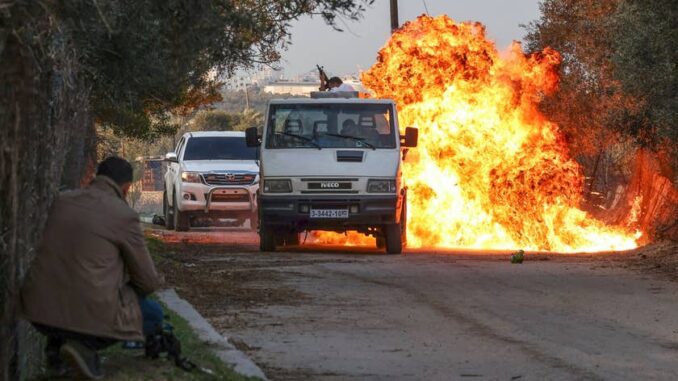T. Belman. Israeli films on Netflix have garnered huge audiences. But now Hamas and others recognize the potential for them to use Netflix to further their propaganda efforts. This is very concerning. I am working on some projects now to publish a very pro-Israel series on Netflix with the PR battle very much in mind.
‘Fist of the Free’ seeks to showcase ‘fighting spirit that resists the occupation,’ says head of artistic production unit for Gaza’s ruling group

A scene from “Fist of the Free.”Credit: Mahmud Hams/AFP
Hamas is soon slated to produce a new television series to counter Netflix’s streaming of “Fauda,” an Israeli series that Hamas sees as depicting Israel’s version of the Israeli-Palestinian conflict.
A statement published on Hamas’ Facebook page and in the Arab media said the Arabic-language series, whose title translates into “Fist of the Free,” will air on the organization’s Al-Aqsa channel during Ramadan, which fall in April this year. Hamas is also distributing it for free to Arab and other foreign channels.>
Mohammed Soraya, director of Hamas’ artistic production unit, said in interviews with AFP and Arabi Post this week that the series is essential given the response to “Fauda” among residents of the Hamas-controlled Gaza Strip.
“The Israeli series was widely criticized, and many people said that watching ‘Fauda’ is another step toward normalization with Israel,” he said. “Netflix is supporting the Zionist occupation by producing many series like ‘Fauda’ that depict the Palestinian people as criminals.
“The series ‘Fist of the Free’ seeks to show the Palestinian viewpoint, the Palestinian resistance and the fighting spirit that resists the occupation,” he continued. “This is a drama series that represents our people.”
The series will stress the power of the Palestinian intelligence services and their ability to fight the occupation, he added. It was written by three Palestinian screenwriters.
The series was inspired by an incident that occurred in Khan Yunis in 2018, when an Israeli special forces unit operating undercover was detected. The ensuing firefight resulted in the deaths of seven Hamas operatives, including the commander of a field unit, and one Israeli officer.
- This is how ‘Fauda’ creators just became $50 million richer
- What Palestinians really think of Netflix’s ‘Palestinian Stories’
- The problem with ‘Palestinian Stories’ on Netflix
The choice of this incident shows that Hamas, aside from its ostensible battle against Netflix, is continuing its war of consciousness against Israel and seeking to bolster its image in Gaza as an organization with strong intelligence capabilities.
The parts are played by local Palestinian actors, some of them amateurs. “Our financial and technical ability to create a drama series in Gaza is very limited, and that is reflected in the salaries of the series’ actors and directors and the short time allotted for producing it,” Soraya said.
The production obviously includes no Israeli actors, so Palestinians play all the Israeli parts. “That was the most significant challenge, to play an Israeli character and convince the viewers to believe it,” Soraya said, adding that the actors prepared intensively to do so.
For instance, Zahir Balbeisi, 65, plays an officer in the Shin Bet security service named David, who is responsible for gathering intelligence on Palestinian operatives in Gaza. To prepare for the part and portray the Shin Bet agent as realistically as possible, Balbeisi met with Palestinians who had recently been freed from Israeli jails.
Gaza’s television industry blossomed in the 1950s, but over the last 20 years the number of series produced has shrunk significantly and there is little funding available for them. Around two months after its takeover of Gaza in 2007, Hamas set up its own production company.
Its first series was a drama about the life of Emad Akel, one of the founders of Hamas’ military wing. He was responsible for several terror attacks that killed Israelis in the 1990s and was eventually killed by Israel.
Soraya said a series Hamas produced two years ago, “The Gate of Paradise,” became very popular and was watched “more than 30 million times.” That series was about the struggle of Palestinians in the West Bank and Jerusalem.



Leave a Reply
You must be logged in to post a comment.